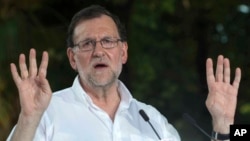Spain's two main political parties held fruitless talks to form a new government Tuesday, and acting Prime Minister Mariano Rajoy said a new election, which would be the third in less than a year, might be necessary.
National elections in December and June left Spain with a hung parliament. The meeting Tuesday involved the only two parties that together command enough seats in parliament to form a majority, the second-place Socialists and Rajoy's People's Party (PP).
Socialist leader Pedro Sanchez, after only his fourth head-to-head meeting with Rajoy since December, reiterated his party would vote against a PP-led administration in an eventual parliamentary confidence vote.
Without at least an abstention by the Socialists — archrivals of the PP and its previous incarnations over the past four decades of democracy in Spain — the conservatives will struggle to get the majority they need to allow Rajoy to govern.
"With this Socialist 'no,' the situation remains blocked and this takes us to a third election," Rajoy told reporters.
The standoff between the parties is so acute that Rajoy and Sanchez did not even detail when they might meet again, and they have yet to outline what broad reforms could provide the basis for an understanding, even with the Socialists in opposition.
Rajoy's PP was stripped of its absolute majority in the December and June elections, after the rise of newer parties during an uneven recovery from recession splintered the political landscape.
Deadline ahead
A rapidly approaching deadline to present 2017's budget to Brussels by mid-October has added urgency to parties' talks. Missing the deadline would most likely cause concern at a time when Spain faces a major effort next year to trim its public deficit.
Spain's economic recovery has largely weathered the uncertainty, with a thriving tourism sector fueling a jobs spurt that has in turn kept consumer spending on track.
The acting government last week raised growth prospects for 2016, though it also trimmed its outlook for 2017 as worries mount over the fallout from Britain's vote to leave the European Union.
Economists also believe fading tailwinds, including the low oil prices currently favoring energy importers like Spain, will make for a more challenging 2017.
Some Socialist insiders believe the party could eventually abstain in a parliamentary investiture vote, allowing the PP to form a minority government. But Rajoy has refused to face such a vote unless he has the Socialists' support ahead of time, perpetuating a game of chicken between the two sides.
"The right-wing parties are the ones that have to reach an agreement. The left is not going to support the right," Sanchez said.
Left-wing parties do not have enough seats to govern together, while Rajoy may struggle to rope in smaller right-wing or centrist rivals. These include regional parties in the likes of Catalonia, where his government has cracked down on a separatist challenge.





